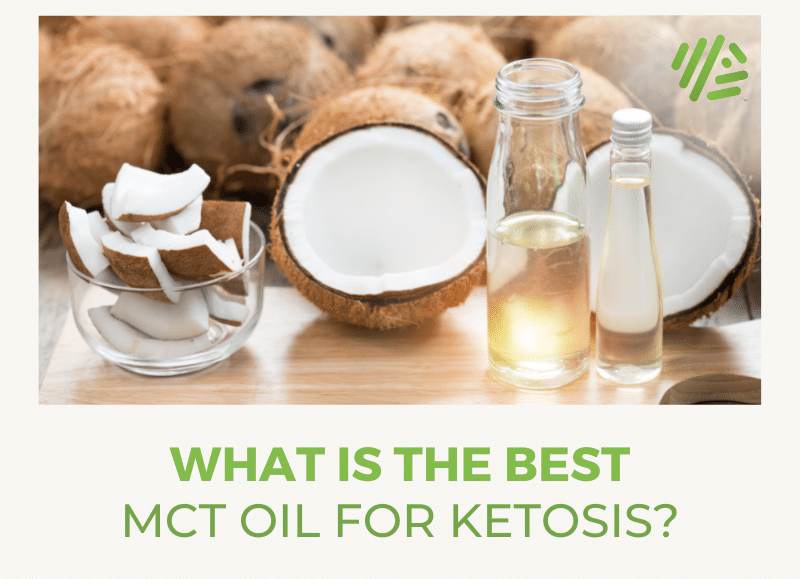What is the Best MCT Oil for Ketosis?

Contents
It’s a popular supplement, but what is MCT oil, anyway?
Put simply, MCT oil is oil rich in medium-chain triglycerides. MCT oil is a precursor to beta-hydroxybutyrate, which is a ketone body (fat molecule) the human body can use for energy.
The best MCT oil for ketosis is probably the one with the highest amount of caprylic acid. Many MCT oils have almost as much capric acid as they do caprylic acid, however, so if ketosis is your goal, you’ll want to skip these in favor of another oil.
Before I dig into this round-up of the best MCT oils for ketosis, one important point: beware cheaper oils that don’t explicitly list their caprylic acid content. There are hundreds of companies out there vying for your money by offering blends of C8, C10, and C12, alongside other fillers such as maltodextrin (a sugar) and emulsifiers and such. If a company isn’t clear about their oil being pure C8, from sustainable sources, and naturally distilled and purified without chemicals, steer clear. Chances are it will not live up to the hype and may cause adverse effects such as gastrointestinal distress.
#1. Nuton’s Brainfood Pure C8 MCT Oil
Nuton’s Brainfood Pure C8 MCT Oil (View price on Amazon) comprises more than 95% caprylic acid, with no lauric acid. This non-GMO MCT oil comes in a tall BPA-free bottle with a spill-resistant top similar to that of an olive oil bottle. Most other MCT oils come in a shampoo-type plastic bottle, leading to spills and slippery messes.
At around $30 for 33.8 fluid ounces ($0.97/fl. oz.), Nuton’s Brainfood oil is a lot less expensive than the Bullet Proof Brain Octane and relatively inexpensive compared to most other competitors. That’s despite Nuton MCT Oil being made in the USA from organic coconuts grown in Malaysia – the company claims that 12 lbs. of organic coconuts go into making every bottle.
Like Bullet Proof’s oil, Nuton’s is naturally extracted using a chemical-free steam distillation process. The acid is converted into oil using glycerin sourced from the organic coconuts themselves. You can mix this one into coffee, tea, soups, and smoothies or use it for low temperature cooking or baking.
Why do I give Nuton first prize for best MCT oil for ketosis? Well, unlike Bullet Proof, this oil is made with organic coconuts and has that spill-free top, in addition to costing less.
#2. Bullet Proof Brain Octane
If you’ve only heard of one company making MCT oil, my bet is that it’s Bullet Proof. This company, founded by David Asprey, put a modern spin on the old yak butter beverage tradition by developing Bullet Proof Coffee (and ruining many a good cup of joe, at least in my opinion). Nowadays, Bullet Proof make a range of products featuring MCT oil, including one of the best MCT oils for ketosis, Bullet Proof’s Brain Octane Oil (View price on Amazon).
This oil is close to 100% caprylic acid (accounting for those glycerin molecules needed to turn the acid into oil). It contains no lauric, capric, or caproic acid. Because this oil is made only with C8 MCTs, it is quickly converted to ketones and used for energy, giving your body and brain a more noticeable boost. Thanks to the mild, slightly nutty taste, you can add it to salads, sushi, soups, and coffee, or just take it by the spoonful.
It’s not just the caprylic acid content and the taste that impresses me though. Brain Octane is also expeller-pressed using only pressure, is refined and purified using water, heat, and pressure, and is produced in the USA from 100% coconut oil.
Why do these things matter? Well, because a large number of lower quality MCT oils are produced using problematic chemical solvents like hexane, are refined using chemical accelerants, and are made overseas under less strict manufacturing regulations. In addition, unless MCT oil is sourced from credibly certified sustainable palm kernel oil, chances are it is contributing to the widespread destruction of the environment, specifically wild orangutan habitat in Southeast Asia.
The downsides to the Bullet Proof Brain Octane are that it is quite a bit more expensive than many other MCT oils at $48.95 for 32 fluid ounces ($1.53 / fl. Oz.) and has a reputation for being a bit ‘drippy’, leading to a slippery bottle and potential waste and spills. The bottle cap itself is also prone to problems, slipping on the thread and leading to spills. My advice is to decant this oil into a glass jar with an easy-pour jar topper or into some other reusable vessel that can be sealed but that pours more easily.
So, despite Bullet Proof Brain Octane having a lot going for it, it’s not my top pick for the best MCT oil for ketosis. Instead, my top pick is Nuton’s Brainfood Pure C8 MCT Oil (View price on Amazon).
#3. MiCkey T Eight MCT Oil
Are there any other contenders for the best MCT oils for ketosis? A close runner up is MiCkey T Eight MCT Oil (View price on Amazon). Made in the USA from coconut oil and sustainable palm kernel oil and comprising almost 100% caprylic acid, this MCT oil is also non-GMO, kosher, and halal certified. The palm kernel oil is certified RSPO (Round Table for Sustainable Palm Oil) and the company offers a certificate of analysis to back up their claims. Oh, and they provide the MCT oil in a BPA-free bottle.
#4. Clean MCT Oil
Clean MCT Oil (View price on Amazon) is another good option. It costs $34.94 for 32 fl. oz. in a plastic bottle, or $42.99 for the same amount in a glass bottle. This oil is made from non-GMO coconuts and comprises almost 100% C8 caprylic acid, with no lauric or capric acid or fillers. The plastic bottle is BPA-free and the bottles have a convenient pouring cap. Clean MCT Oil is triple steam distilled in a chemical-free process and the company claims the coconuts are sustainably sourced, with the product made in the U.S.
#5. Kiss My Keto MCT Oil Softgels
And finally, if you find the liquid oil unpalatable or inconvenient for traveling or use at work, consider Kiss My Keto’s MCT Oil Softgels (View price on Amazon). The MCT oil is derived from organic coconuts and is extracted in a chemical-free process. It is encapsulated in gelatin, however, meaning that it isn’t vegan or vegetarian. Their recommended dose is 3 capsules up to five times daily and you can either swallow the softgels or drop them into a hot beverage, whereupon the capsule will dissolve to release the oil.
The MCT oil itself comprises 55-63% caprylic acid (C8) and 37-45% capric acid (C10) – I found three different percentages listed by the company for the same product, which doesn’t inspire a lot of confidence. Either way, this isn’t pure C8 oil, meaning it’s not quite as ketogenic as straight-up caprylic acid MCT oil liquids. Still, it appears to be one of the best MCT softgel options around for ketosis as it is free from lauric acid, favoring the more quickly converted MCTs.
The same folks who make Clean MCT Oil used to make 100% C8 capsules too, but these seem to have vanished from the market. If travel-friendly MCT oil is what you’re after, and you’re adamant about using pure C8, you might want to check out Bullet Proof’s Brain Octane Go Packs (View price on Amazon). Each packet contains 1 tablespoon of their C8 MCT oil. That makes the Go Packs a handy portable option if you’re already used to taking that amount. Otherwise, you may want to use a clip to reseal the sachet and make it last a few days while on the road.
What about the brain benefits of MCT oil?
Some people choose to use MCT oil not as an antimicrobial or for weight loss but to help support brain health on a ketogenic diet. Bullet Proof’s Brain Octane Oil (View price on Amazon) comprises almost entirely caprylic acid and claims to be best for both ketosis and boosting brain health. As you’ll see below, however, this is not my top pick for the best MCT oil for ketosis.
The feeling of mental sharpness sometimes experienced after taking MCT oil may be a result of quicker energy conversion in the brain. By encouraging the brain to preferentially burn fats, MCT oil could help us avoid the slump in energy many of us feel after eating a carb-heavy meal or snack.
In one study, 30 g of MCT oil containing a mixture of caprylic (55%) and capric acids (35%) helped compensate for brain glucose deficits in people with mild-moderate Alzheimer’s disease eating a ketogenic diet. Unfortunately, early studies indicate that cognitive improvements from MCT supplementation are not as profound in those with APOE4 variations.1 2 For more on Alzheimer’s and diet, see this blog post.
As for boosting mood, the jury is still out on that one. In one small study involving just 28 healthy adults, for example, researchers saw a trend towards, but no clear indication that MCT oil improved mood or time to ketosis.11 My take on this is that, if your options are a low carb ketogenic diet without MCT oil or with a good MCT oil, your brain will be far happier with the supplement. As for using the MCT oil as a supplement alongside a regular non-ketogenic diet, I’m doubtful you’ll see much of a brain boost.
Any potential downsides of MCT oil?
If you want to take a more heterogenous, natural MCT oil that hasn’t been filtered to contain pure caprylic acid, you’ll need to take more of it to get into ketosis. The beauty of something like Brain Octane is that you can get into ketosis with a much smaller dose.
Also, bear in mind that MCT oil in high doses or every day may raise your LDL cholesterol to undesirable levels (see the Retterstøl study for more on this). You may also experience unpleasant gastrointestinal side effects, such as diarrhea, or even bowel incontinence. For more, see our post on MCT oil side effects.
How do you take MCT oil?
If you’re just starting to take MCT oil, your best bet is to take 1 teaspoon a day for the first few days and scale up to 1 tablespoon a day thereafter. If this doesn’t cause any unpleasant side effects, you may want to boost it to 2 tablespoons a day. The dose will also depend on the MCT content of the oil, i.e. how much lauric and capric acid are in there, if any.
Many people take their MCT oil straight off the spoon. Others add it to a smoothie or juice or use it in a salad dressing or on top of other food. If you’re using coconut oil instead of an MCT oil supplement, you might want to cook with the oil. You can also add MCT oil to coffee.
The takeaway
In summary, my top recommendations for the best MCT oil for ketosis are:
- Nuton’s Brainfood Pure C8 MCT Oil (View price on Amazon) – Pure C8, non-GMO, hexane-free, steam distilled, MCT oil derived from organic coconuts and made in the U.S. Cheaper per fluid ounce than most competitors and comes in a BPA-free bottle with a spill-resistant top
- Bullet Proof’s Brain Octane Oil (View price on Amazon) – Pure C8, high-quality MCT oil in a BPA-free plastic bottle. Their Go Packs (View price on Amazon) are best for travel.
- Clean MCT Oil (View price on Amazon) – Available in amber glass bottles and BPA-free plastic bottles with a spill-free cap. Made in the U.S. from non-GMO sustainably sourced coconuts and comprises almost 100% C8 caprylic acid. Triple steam distilled in a chemical-free process.
- MiCkey T Eight MCT Oil (View price on Amazon) – Made in the USA from coconut oil and certified RSPO sustainable palm kernel oil, pure C8 oil, non-GMO, kosher, and halal certified. Certificate of analysis available. BPA-free bottle.
- Kiss My Keto’s MCT Oil Softgels (View price on Amazon) – a blend of C8 and C10 in gelatin softgels for easy travel. Start with a low dose and work up to avoid tummy troubles. You can swallow the softgels by themselves or drop them into a hot beverage to disperse the oil. Not suitable for vegetarians or vegans.



